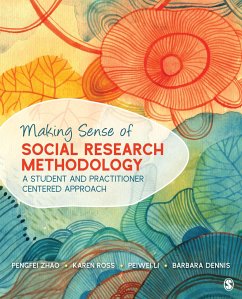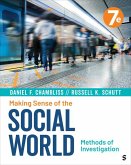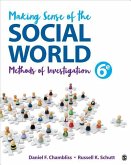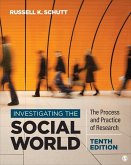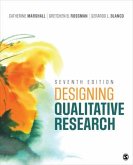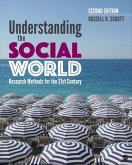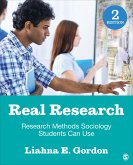Pengfei Zhao, Karen Ross, Peiwei Li
Making Sense of Social Research Methodology
A Student and Practitioner Centered Approach
Pengfei Zhao, Karen Ross, Peiwei Li
Making Sense of Social Research Methodology
A Student and Practitioner Centered Approach
- Broschiertes Buch
- Merkliste
- Auf die Merkliste
- Bewerten Bewerten
- Teilen
- Produkt teilen
- Produkterinnerung
- Produkterinnerung
The authors introduce students to research methods by illuminating the underlying assumptions of social science inquiry.
Andere Kunden interessierten sich auch für
![Making Sense of the Social World Making Sense of the Social World]() Daniel F ChamblissMaking Sense of the Social World199,99 €
Daniel F ChamblissMaking Sense of the Social World199,99 €![Making Sense of the Social World Making Sense of the Social World]() Daniel F ChamblissMaking Sense of the Social World195,99 €
Daniel F ChamblissMaking Sense of the Social World195,99 €![Investigating the Social World Investigating the Social World]() Russell K SchuttInvestigating the Social World236,99 €
Russell K SchuttInvestigating the Social World236,99 €![Designing Qualitative Research Designing Qualitative Research]() Catherine MarshallDesigning Qualitative Research125,99 €
Catherine MarshallDesigning Qualitative Research125,99 €![Understanding the Social World Understanding the Social World]() Russell K SchuttUnderstanding the Social World199,99 €
Russell K SchuttUnderstanding the Social World199,99 €![Making Sense of the Social World Making Sense of the Social World]() Daniel F ChamblissMaking Sense of the Social World115,99 €
Daniel F ChamblissMaking Sense of the Social World115,99 €![Real Research Real Research]() Liahna E GordonReal Research170,99 €
Liahna E GordonReal Research170,99 €-
-
-
The authors introduce students to research methods by illuminating the underlying assumptions of social science inquiry.
Hinweis: Dieser Artikel kann nur an eine deutsche Lieferadresse ausgeliefert werden.
Hinweis: Dieser Artikel kann nur an eine deutsche Lieferadresse ausgeliefert werden.
Produktdetails
- Produktdetails
- Verlag: SAGE Publications Inc
- Seitenzahl: 496
- Erscheinungstermin: 3. Februar 2021
- Englisch
- Abmessung: 235mm x 191mm x 28mm
- Gewicht: 946g
- ISBN-13: 9781506378688
- ISBN-10: 1506378684
- Artikelnr.: 59916602
- Herstellerkennzeichnung
- Libri GmbH
- Europaallee 1
- 36244 Bad Hersfeld
- gpsr@libri.de
- Verlag: SAGE Publications Inc
- Seitenzahl: 496
- Erscheinungstermin: 3. Februar 2021
- Englisch
- Abmessung: 235mm x 191mm x 28mm
- Gewicht: 946g
- ISBN-13: 9781506378688
- ISBN-10: 1506378684
- Artikelnr.: 59916602
- Herstellerkennzeichnung
- Libri GmbH
- Europaallee 1
- 36244 Bad Hersfeld
- gpsr@libri.de
Pengfei Zhao is an Assistant Professor at the University of Florida in the Research and Evaluation Methodology Program. She has an interdisciplinary background in inquiry methodology, sociology, and cultural studies. In her research and teaching, Pengfei draws from a wide spectrum of theories-from critical theories to contemporary pragmatism and feminism-to formulate a praxis- and social justice-oriented research methodology. Primarily using ethnographic, narrative, and participatory methodologies, she is interested in the challenges of and innovative approaches to conducting research in culturally diverse and politically troubled contexts. Such efforts are manifested in her writing on doing research in authoritarian states, the institutionalization of research regulation in East Asian contexts, and translation in qualitative research. Currently, Pengfei is completing a book manuscript based on her critical ethnographic study of rural youth's coming of age experience during China's drastic transition from socialism to late-socialism.
Preface About the Authors Chapter 1: Our Research Story: A Prelude Paths Toward Research Making Implicit Explicit: Our Intentions and Assumptions About Reading This Book CLUSTER 1
UNDERSTANDING RESEARCH: MAKING SENSE OF UNDERLYING ASSUMPTIONS Roots and Branches Chapter 2: How Do We Know? That Is the Question Musing Upon the Everyday: Enquiring Minds Want to Know Narrative and Conceptual Interludes: The Meaning of "Research" Research Scenario: Researching Through Collective Values: The Feminist Research Collective Synthesis: An Open Dialogue Chapter 3: Research, Identity, and Relational Processes Musing Upon the Everyday: The Presentation of Self Research Scenario: A Collaborative Action Research Project Synthesis: Points for Reflection Chapter 4: Ethical Considerations Across the Spectrum of Research Musing Upon the Everyday: What Would You Do? Narratives and Conceptual Interludes: On Being Ethical in Research Practices Research Scenario: Marginalia: Sara McClelland Synthesis: Points for Reflection Chapter 5: Knowledge and Meaning in Research Musing Upon the Everyday: Understanding Meaning Narrative and Conceptual Interludes: Different Ways of Knowing Research Scenario: My "Fat Girl Complex" Synthesis: Points for Reflection Chapter 6: Sociopolitical Conditions of Research Musing Upon the Everyday Narrative and Conceptual Interludes Research Scenario: Making a Difference as a Researcher Synthesis: Points for Reflection Chapter 7: Validity in the Context of Research Musing Upon the Everyday: Validity in (Mis)understanding Narrative and Conceptual Interludes: Do We Really Know the Truth? Research Scenario: Validity and Assessment: David Rutkowski Synthesis: Points for Reflection CLUSTER 2
WHAT IS THE MEANING OF "DATA"? Roadmap Chapter 8: What Am I Looking For? Revisiting Research and Identity in the Context of Data Musing Upon the Everyday: Solving Problems That Matter to Us Narrative and Conceptual Interludes: A Researcher and Their Organizing Research Scenario: Studying a Rare Condition: Jenny Downs Synthesis: Points for Reflection Chapter 9: Defining Data Musing Upon the Everyday: How Much Should I Pay for My First Home? Narrative and Conceptual Interludes Research Scenario: The Effects of Power on Ethnographic Research: Ke Li Synthesis: Points for Reflection Chapter 10: Generating and Acquiring Data Musing Upon the Everyday: How Should I Make That Lasagna? Narrative and Conceptual Interludes: A Day in the Life of a Researcher Research Scenario: Making Choices About Data Generation Synthesis: Points for Reflection Chapter 11: How Do I Know I Have "Enough" Data? How Do I Know I Have "Good" Data? Musing Upon the Everyday: How Did the Lasagna Turn Out? Narrative and Conceptual Interludes: Creating the Perfect Recipe Research Scenario: Evaluating the Data Generation and Acquisition Process Synthesis: Points for Reflection CLUSTER 3
HOW DO WE CONCEPTUALIZE "INFERENCE"? Connecting the Dots Chapter 12: Understanding Inference as a Process Musing Upon the Everyday: The World of Iris Narrative and Conceptual Interludes I: Making Sensible Interpretations Narrative and Conceptual Interlude II: Applying the Insights of Critical Pragmatism to Social Research Research Scenario: Understanding and Serving Today's College Students. The Problem of Basic Needs Insecurity: Katharine Broton Synthesis: Points for Reflection Chapter 13: Description and Inference in the Research Sphere Musing Upon the Everyday: The Process of Making Choices Narrative and Conceptual Interludes: What to Make of the GRE? Research Scenario: Making Decisions Synthesis: Points for Reflection Chapter 14: Making Inferences About Trends and Experiences Musing Upon the Everyday: Obesity Is Contagious Narrative and Conceptual Interludes: Making Inferences That Matter Research Scenario: Youth Encounter Programs in Israel: Karen Ross Synthesis: Points for Reflection Chapter 15: Writing Up Research Musing Upon the Everyday Narrative and Conceptual Interludes Research Scenario: Double Writing in Participatory Action Research: Meagan Call-Cummings Synthesis: Points for Reflection Chapter 16: Coming Back Full Circle: Implications of the Inferential Process Musing Upon the Everyday: What Is in My Food? Narrative and Conceptual Interludes: Research Impact- for What, for Whom, and by Whom? Research Scenario: Extrapolating Social Change From Research: Positionality, Iterativity, and Envisioning: Hakim Mohandas Amani Williams Synthesis: Points for Reflection Chapter 17: Postlude Appendix A: Statistical Tests Used to Establish Causal Inferences Appendix B: Statistical Tests Used to Establish Correlational Inferences Appendix C: Getting Clarity About the Vision of Your Class Project Appendix D: A Generic Rubric for Evaluating Empirical Research Articles Glossary of Terms About the Contributors References
UNDERSTANDING RESEARCH: MAKING SENSE OF UNDERLYING ASSUMPTIONS Roots and Branches Chapter 2: How Do We Know? That Is the Question Musing Upon the Everyday: Enquiring Minds Want to Know Narrative and Conceptual Interludes: The Meaning of "Research" Research Scenario: Researching Through Collective Values: The Feminist Research Collective Synthesis: An Open Dialogue Chapter 3: Research, Identity, and Relational Processes Musing Upon the Everyday: The Presentation of Self Research Scenario: A Collaborative Action Research Project Synthesis: Points for Reflection Chapter 4: Ethical Considerations Across the Spectrum of Research Musing Upon the Everyday: What Would You Do? Narratives and Conceptual Interludes: On Being Ethical in Research Practices Research Scenario: Marginalia: Sara McClelland Synthesis: Points for Reflection Chapter 5: Knowledge and Meaning in Research Musing Upon the Everyday: Understanding Meaning Narrative and Conceptual Interludes: Different Ways of Knowing Research Scenario: My "Fat Girl Complex" Synthesis: Points for Reflection Chapter 6: Sociopolitical Conditions of Research Musing Upon the Everyday Narrative and Conceptual Interludes Research Scenario: Making a Difference as a Researcher Synthesis: Points for Reflection Chapter 7: Validity in the Context of Research Musing Upon the Everyday: Validity in (Mis)understanding Narrative and Conceptual Interludes: Do We Really Know the Truth? Research Scenario: Validity and Assessment: David Rutkowski Synthesis: Points for Reflection CLUSTER 2
WHAT IS THE MEANING OF "DATA"? Roadmap Chapter 8: What Am I Looking For? Revisiting Research and Identity in the Context of Data Musing Upon the Everyday: Solving Problems That Matter to Us Narrative and Conceptual Interludes: A Researcher and Their Organizing Research Scenario: Studying a Rare Condition: Jenny Downs Synthesis: Points for Reflection Chapter 9: Defining Data Musing Upon the Everyday: How Much Should I Pay for My First Home? Narrative and Conceptual Interludes Research Scenario: The Effects of Power on Ethnographic Research: Ke Li Synthesis: Points for Reflection Chapter 10: Generating and Acquiring Data Musing Upon the Everyday: How Should I Make That Lasagna? Narrative and Conceptual Interludes: A Day in the Life of a Researcher Research Scenario: Making Choices About Data Generation Synthesis: Points for Reflection Chapter 11: How Do I Know I Have "Enough" Data? How Do I Know I Have "Good" Data? Musing Upon the Everyday: How Did the Lasagna Turn Out? Narrative and Conceptual Interludes: Creating the Perfect Recipe Research Scenario: Evaluating the Data Generation and Acquisition Process Synthesis: Points for Reflection CLUSTER 3
HOW DO WE CONCEPTUALIZE "INFERENCE"? Connecting the Dots Chapter 12: Understanding Inference as a Process Musing Upon the Everyday: The World of Iris Narrative and Conceptual Interludes I: Making Sensible Interpretations Narrative and Conceptual Interlude II: Applying the Insights of Critical Pragmatism to Social Research Research Scenario: Understanding and Serving Today's College Students. The Problem of Basic Needs Insecurity: Katharine Broton Synthesis: Points for Reflection Chapter 13: Description and Inference in the Research Sphere Musing Upon the Everyday: The Process of Making Choices Narrative and Conceptual Interludes: What to Make of the GRE? Research Scenario: Making Decisions Synthesis: Points for Reflection Chapter 14: Making Inferences About Trends and Experiences Musing Upon the Everyday: Obesity Is Contagious Narrative and Conceptual Interludes: Making Inferences That Matter Research Scenario: Youth Encounter Programs in Israel: Karen Ross Synthesis: Points for Reflection Chapter 15: Writing Up Research Musing Upon the Everyday Narrative and Conceptual Interludes Research Scenario: Double Writing in Participatory Action Research: Meagan Call-Cummings Synthesis: Points for Reflection Chapter 16: Coming Back Full Circle: Implications of the Inferential Process Musing Upon the Everyday: What Is in My Food? Narrative and Conceptual Interludes: Research Impact- for What, for Whom, and by Whom? Research Scenario: Extrapolating Social Change From Research: Positionality, Iterativity, and Envisioning: Hakim Mohandas Amani Williams Synthesis: Points for Reflection Chapter 17: Postlude Appendix A: Statistical Tests Used to Establish Causal Inferences Appendix B: Statistical Tests Used to Establish Correlational Inferences Appendix C: Getting Clarity About the Vision of Your Class Project Appendix D: A Generic Rubric for Evaluating Empirical Research Articles Glossary of Terms About the Contributors References
Preface About the Authors Chapter 1: Our Research Story: A Prelude Paths Toward Research Making Implicit Explicit: Our Intentions and Assumptions About Reading This Book CLUSTER 1
UNDERSTANDING RESEARCH: MAKING SENSE OF UNDERLYING ASSUMPTIONS Roots and Branches Chapter 2: How Do We Know? That Is the Question Musing Upon the Everyday: Enquiring Minds Want to Know Narrative and Conceptual Interludes: The Meaning of "Research" Research Scenario: Researching Through Collective Values: The Feminist Research Collective Synthesis: An Open Dialogue Chapter 3: Research, Identity, and Relational Processes Musing Upon the Everyday: The Presentation of Self Research Scenario: A Collaborative Action Research Project Synthesis: Points for Reflection Chapter 4: Ethical Considerations Across the Spectrum of Research Musing Upon the Everyday: What Would You Do? Narratives and Conceptual Interludes: On Being Ethical in Research Practices Research Scenario: Marginalia: Sara McClelland Synthesis: Points for Reflection Chapter 5: Knowledge and Meaning in Research Musing Upon the Everyday: Understanding Meaning Narrative and Conceptual Interludes: Different Ways of Knowing Research Scenario: My "Fat Girl Complex" Synthesis: Points for Reflection Chapter 6: Sociopolitical Conditions of Research Musing Upon the Everyday Narrative and Conceptual Interludes Research Scenario: Making a Difference as a Researcher Synthesis: Points for Reflection Chapter 7: Validity in the Context of Research Musing Upon the Everyday: Validity in (Mis)understanding Narrative and Conceptual Interludes: Do We Really Know the Truth? Research Scenario: Validity and Assessment: David Rutkowski Synthesis: Points for Reflection CLUSTER 2
WHAT IS THE MEANING OF "DATA"? Roadmap Chapter 8: What Am I Looking For? Revisiting Research and Identity in the Context of Data Musing Upon the Everyday: Solving Problems That Matter to Us Narrative and Conceptual Interludes: A Researcher and Their Organizing Research Scenario: Studying a Rare Condition: Jenny Downs Synthesis: Points for Reflection Chapter 9: Defining Data Musing Upon the Everyday: How Much Should I Pay for My First Home? Narrative and Conceptual Interludes Research Scenario: The Effects of Power on Ethnographic Research: Ke Li Synthesis: Points for Reflection Chapter 10: Generating and Acquiring Data Musing Upon the Everyday: How Should I Make That Lasagna? Narrative and Conceptual Interludes: A Day in the Life of a Researcher Research Scenario: Making Choices About Data Generation Synthesis: Points for Reflection Chapter 11: How Do I Know I Have "Enough" Data? How Do I Know I Have "Good" Data? Musing Upon the Everyday: How Did the Lasagna Turn Out? Narrative and Conceptual Interludes: Creating the Perfect Recipe Research Scenario: Evaluating the Data Generation and Acquisition Process Synthesis: Points for Reflection CLUSTER 3
HOW DO WE CONCEPTUALIZE "INFERENCE"? Connecting the Dots Chapter 12: Understanding Inference as a Process Musing Upon the Everyday: The World of Iris Narrative and Conceptual Interludes I: Making Sensible Interpretations Narrative and Conceptual Interlude II: Applying the Insights of Critical Pragmatism to Social Research Research Scenario: Understanding and Serving Today's College Students. The Problem of Basic Needs Insecurity: Katharine Broton Synthesis: Points for Reflection Chapter 13: Description and Inference in the Research Sphere Musing Upon the Everyday: The Process of Making Choices Narrative and Conceptual Interludes: What to Make of the GRE? Research Scenario: Making Decisions Synthesis: Points for Reflection Chapter 14: Making Inferences About Trends and Experiences Musing Upon the Everyday: Obesity Is Contagious Narrative and Conceptual Interludes: Making Inferences That Matter Research Scenario: Youth Encounter Programs in Israel: Karen Ross Synthesis: Points for Reflection Chapter 15: Writing Up Research Musing Upon the Everyday Narrative and Conceptual Interludes Research Scenario: Double Writing in Participatory Action Research: Meagan Call-Cummings Synthesis: Points for Reflection Chapter 16: Coming Back Full Circle: Implications of the Inferential Process Musing Upon the Everyday: What Is in My Food? Narrative and Conceptual Interludes: Research Impact- for What, for Whom, and by Whom? Research Scenario: Extrapolating Social Change From Research: Positionality, Iterativity, and Envisioning: Hakim Mohandas Amani Williams Synthesis: Points for Reflection Chapter 17: Postlude Appendix A: Statistical Tests Used to Establish Causal Inferences Appendix B: Statistical Tests Used to Establish Correlational Inferences Appendix C: Getting Clarity About the Vision of Your Class Project Appendix D: A Generic Rubric for Evaluating Empirical Research Articles Glossary of Terms About the Contributors References
UNDERSTANDING RESEARCH: MAKING SENSE OF UNDERLYING ASSUMPTIONS Roots and Branches Chapter 2: How Do We Know? That Is the Question Musing Upon the Everyday: Enquiring Minds Want to Know Narrative and Conceptual Interludes: The Meaning of "Research" Research Scenario: Researching Through Collective Values: The Feminist Research Collective Synthesis: An Open Dialogue Chapter 3: Research, Identity, and Relational Processes Musing Upon the Everyday: The Presentation of Self Research Scenario: A Collaborative Action Research Project Synthesis: Points for Reflection Chapter 4: Ethical Considerations Across the Spectrum of Research Musing Upon the Everyday: What Would You Do? Narratives and Conceptual Interludes: On Being Ethical in Research Practices Research Scenario: Marginalia: Sara McClelland Synthesis: Points for Reflection Chapter 5: Knowledge and Meaning in Research Musing Upon the Everyday: Understanding Meaning Narrative and Conceptual Interludes: Different Ways of Knowing Research Scenario: My "Fat Girl Complex" Synthesis: Points for Reflection Chapter 6: Sociopolitical Conditions of Research Musing Upon the Everyday Narrative and Conceptual Interludes Research Scenario: Making a Difference as a Researcher Synthesis: Points for Reflection Chapter 7: Validity in the Context of Research Musing Upon the Everyday: Validity in (Mis)understanding Narrative and Conceptual Interludes: Do We Really Know the Truth? Research Scenario: Validity and Assessment: David Rutkowski Synthesis: Points for Reflection CLUSTER 2
WHAT IS THE MEANING OF "DATA"? Roadmap Chapter 8: What Am I Looking For? Revisiting Research and Identity in the Context of Data Musing Upon the Everyday: Solving Problems That Matter to Us Narrative and Conceptual Interludes: A Researcher and Their Organizing Research Scenario: Studying a Rare Condition: Jenny Downs Synthesis: Points for Reflection Chapter 9: Defining Data Musing Upon the Everyday: How Much Should I Pay for My First Home? Narrative and Conceptual Interludes Research Scenario: The Effects of Power on Ethnographic Research: Ke Li Synthesis: Points for Reflection Chapter 10: Generating and Acquiring Data Musing Upon the Everyday: How Should I Make That Lasagna? Narrative and Conceptual Interludes: A Day in the Life of a Researcher Research Scenario: Making Choices About Data Generation Synthesis: Points for Reflection Chapter 11: How Do I Know I Have "Enough" Data? How Do I Know I Have "Good" Data? Musing Upon the Everyday: How Did the Lasagna Turn Out? Narrative and Conceptual Interludes: Creating the Perfect Recipe Research Scenario: Evaluating the Data Generation and Acquisition Process Synthesis: Points for Reflection CLUSTER 3
HOW DO WE CONCEPTUALIZE "INFERENCE"? Connecting the Dots Chapter 12: Understanding Inference as a Process Musing Upon the Everyday: The World of Iris Narrative and Conceptual Interludes I: Making Sensible Interpretations Narrative and Conceptual Interlude II: Applying the Insights of Critical Pragmatism to Social Research Research Scenario: Understanding and Serving Today's College Students. The Problem of Basic Needs Insecurity: Katharine Broton Synthesis: Points for Reflection Chapter 13: Description and Inference in the Research Sphere Musing Upon the Everyday: The Process of Making Choices Narrative and Conceptual Interludes: What to Make of the GRE? Research Scenario: Making Decisions Synthesis: Points for Reflection Chapter 14: Making Inferences About Trends and Experiences Musing Upon the Everyday: Obesity Is Contagious Narrative and Conceptual Interludes: Making Inferences That Matter Research Scenario: Youth Encounter Programs in Israel: Karen Ross Synthesis: Points for Reflection Chapter 15: Writing Up Research Musing Upon the Everyday Narrative and Conceptual Interludes Research Scenario: Double Writing in Participatory Action Research: Meagan Call-Cummings Synthesis: Points for Reflection Chapter 16: Coming Back Full Circle: Implications of the Inferential Process Musing Upon the Everyday: What Is in My Food? Narrative and Conceptual Interludes: Research Impact- for What, for Whom, and by Whom? Research Scenario: Extrapolating Social Change From Research: Positionality, Iterativity, and Envisioning: Hakim Mohandas Amani Williams Synthesis: Points for Reflection Chapter 17: Postlude Appendix A: Statistical Tests Used to Establish Causal Inferences Appendix B: Statistical Tests Used to Establish Correlational Inferences Appendix C: Getting Clarity About the Vision of Your Class Project Appendix D: A Generic Rubric for Evaluating Empirical Research Articles Glossary of Terms About the Contributors References

